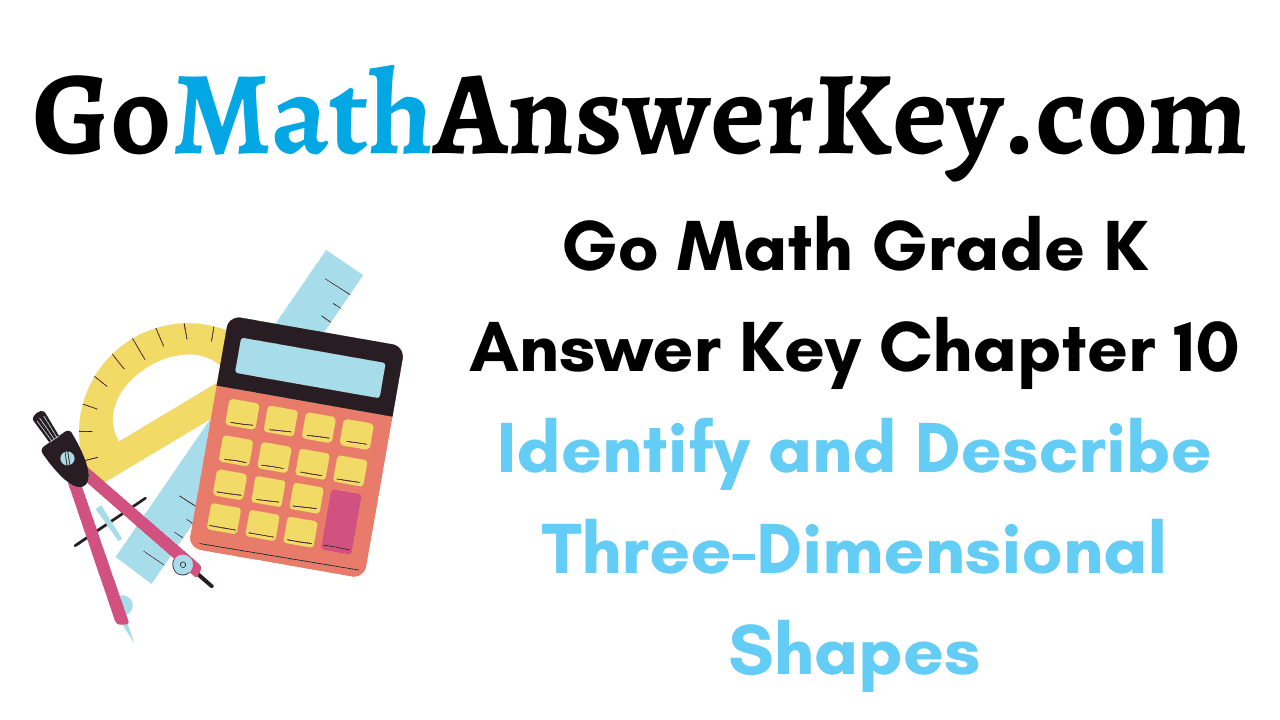Students of Grade K can get a strong foundation on mathematics concepts by referring to the Go Math Grade K Chapter 10 Answer Key Identify and Describe Three-Dimensional Shapes. Go Math Grade K Answer Key Ch 10 was developed by highly professional mathematics educators and the solutions prepared by them are in a concise manner for easy grasping. Make use of these quick resources to stand out from the crowd and practice on a frequent basis.
Go Math Grade K Chapter 10 Answer Key Identify and Describe Three-Dimensional Shapes
To achieve high score s in Grade K, students need to solve all questions and exercises included in Go Math Grade K. So, teachers and students can find this Go Math Answer Key for Grade K more helpful in raising students’ scores and supporting teachers to educate the students. With the help of Go Math Primary School Grade K Answer Key, you can think deeply regarding what you are learning, and you will really learn math easily just like that.
Identify and Describe Three-Dimensional Shapes
- Identify and Describe Three-Dimensional Shapes Show What You Know – Page 570
- Identify and Describe Three-Dimensional Shapes Game Follow the Shapes – Page 571
- Identify and Describe Three-Dimensional Shapes Vocabulary Game – Page 572
Lesson: 1 Three-Dimensional Shapes
- Lesson 10.1 Three-Dimensional Shapes – Page(573-578)
- Three-Dimensional Shapes Homework & Practice 10.1 – Page(577-578)
Lesson: 2 Identify, Name, and Describe Spheres
- Lesson 10.2 Identify, Name, and Describe Spheres – Page(579-584)
- Identify, Name, and Describe Spheres Homework & Practice 10.2 – Page(583-584)
Lesson: 3 Identify, Name, and Describe Cubes
- Lesson 10.3 Identify, Name, and Describe Cubes – Page(585-590)
- Identify, Name, and Describe Cubes Homework & Practice 10.3 – Page(589-590)
Lesson: 4 Identify, Name, and Describe Cylinders
- Lesson 10.4 Identify, Name, and Describe Cylinders – Page(591-596)
- Identify, Name, and Describe Cylinders Homework & Practice 10.4 – Page(595-596)
Lesson: 5 Identify, Name, and Describe Cones
- Lesson 10.5 Identify, Name, and Describe Cones – Page(597-602)
- Identify, Name, and Describe Cones Homework & Practice 10.5 – Page(601-602)
Lesson: 6 Problem Solving • Two- and Three-Dimensional Shapes
- Lesson 10.6 Problem Solving • Two- and Three-Dimensional Shapes – Page(603-608)
- Problem Solving • Two- and Three-Dimensional Shapes Homework & Practice 10.6 – Page(607-608)
Lesson: 7 Model Shapes
Lesson: 8 Above and Below
- Lesson 10.8 Above and Below – Page(615-620)
- Above and Below Homework & Practice 10.8 – Page(619-620)
Lesson: 9 Beside and Next To
- Lesson 10.9 Beside and Next To – Page(621-626)
- Beside and Next To Homework & Practice 10.9 – Page(625-626)
Lesson: 10 In Front Of and Behind
- Lesson 10.10 In Front Of and Behind – Page(627-632)
- In Front Of and Behind Homework & Practice 10.10 – Page(631-632)
- Identify and Describe Three-Dimensional Shapes Review/Test – Page(633-636)
Identify and Describe Three-Dimensional Shapes Show What You Know
DIRECTIONS 1. Use red to color the squares. Use blue to color the triangles. 2–3. Look at the shape. Write how many sides. Write how many vertices. 4. Mark an X on the shapes with three sides.
Identify Shapes
Question 1.

Answer:
The number of squares = 2.
Explanation:
In the above-given figure,
given that,
There are 2 squares.
the number of squares = 2.
Answer:
The number of triangles = 2.
Explanation:
In the above-given figure,
given that,
There are 2 triangles.
the number of triangles = 2.

Describe Shapes
Question 2.

_________
_ _ _ _ _ _ _
_________ sides
_________
_ _ _ _ _ _ _
_________ vertices
Answer:
The number of sides = 3.
The number of vertices = 3.
Explanation:
In the above-given figure,
given that,
The triangle has 3 sides and 3 vertices.
the number of sides = 3.
The number of vertices = 3.
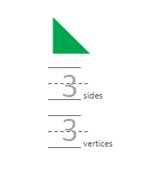
Question 3.

_________
_ _ _ _ _ _ _
_________ sides
_________
_ _ _ _ _ _ _
_________ vertices
Answer:
The number of sides = 4.
The number of vertices = 4.
Explanation:
In the above-given figure,
given that,
The rectangle has 4 sides and 4 vertices.
the number of sides = 4.
The number of vertices = 4.
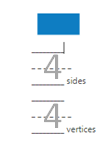
Sort Shapes
Question 4.

Answer:
The number of sides = 3.
The number of vertices = 3.
Explanation:
In the above-given figure,
given that,
The triangle has 3 sides and 3 vertices.
the number of sides = 3.
The number of vertices = 3.
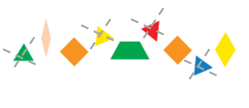
Identify and Describe Three-Dimensional Shapes Vocabulary Builder
DIRECTIONS Mark an X on the food shaped like a circle. Draw a line under the food shaped like a square. Circle the food shaped like a triangle.
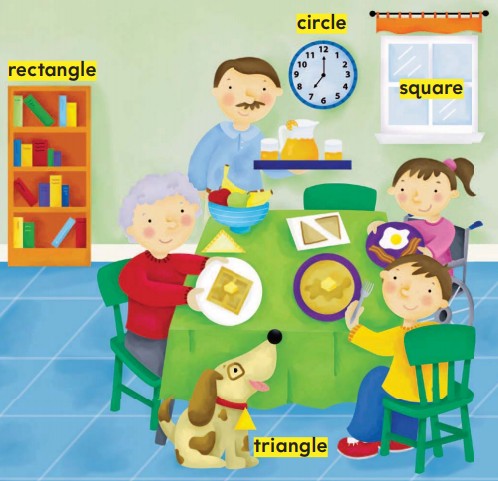
Answer:
The number of squares = 1.
Explanation:
In the above-given figure,
given that,
There is 1 square.
the number of squares = 1.
Answer:
The number of triangles = 1.
Explanation:
In the above-given figure,
given that,
There is 1 triangle.
the number of triangles = 1.
Answer:
The number of circles = 1.
Explanation:
In the above-given figure,
given that,
There is 1 circle.
the number of circles = 1.
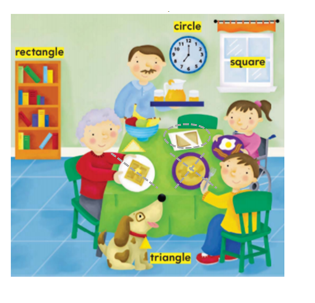
Identify and Describe Three-Dimensional Shapes Game Follow the Shapes
DIRECTIONS Choose a shape from START. Follow the path that has the same shapes. Draw a line to show the path to the END with the same shape.
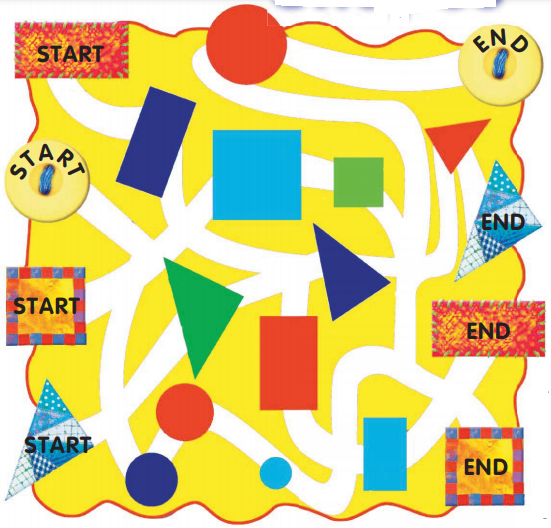
Answer:
The shape is Rectangle.
Explanation:
In the above-given question,
given that,
I choose the shape Rectangle.
So I started at the rectangle.
The line passes through the end.
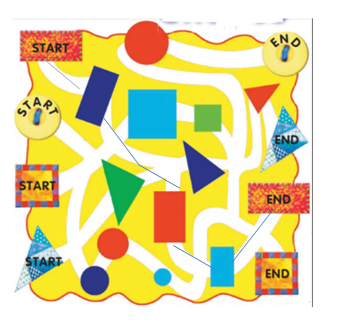
Identify and Describe Three-Dimensional Shapes Vocabulary Game
Picture It
DIRECTIONS Players take turns. A player chooses a secret word from the Word Box and then sets the timer. The player draws pictures to give hints about the secret word. If the other player guesses the secret word before time runs out, he or she puts a counter in the chart. The first player who has counters in all his or her boxes is the winner.
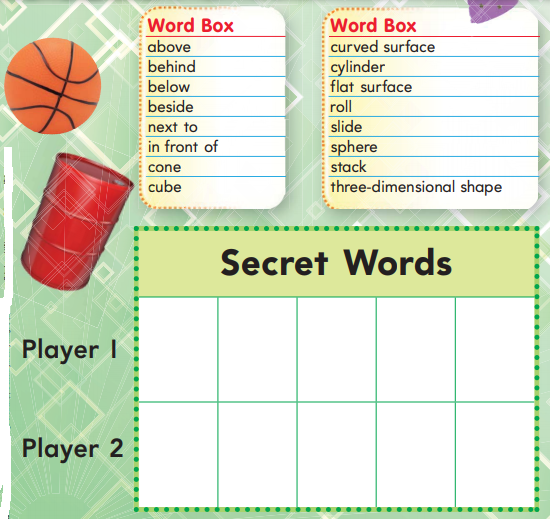
Answer:
The player chooses the words curved surface, roll, beside, and cube.
Explanation:
In the above-given question,
given that,
There are many words in the wordbox.
but the player chooses only some words.
The player chooses the words curved surface, roll, beside, and cube.
The Write Way
DIRECTIONS Choose one idea. • Choose 2 three-dimensional shapes. Draw to show what you know about the shapes. • Draw to show above, below, and next to. Reflect Be ready to tell about your drawing.

Answer:
The Three- dimensional shapes are cube and cylinder.
Explanation:
In the above-given question,
given that,
The shapes are cylinder, circle, cone, and square.
The Three- dimensional shapes are cube and cylinder.
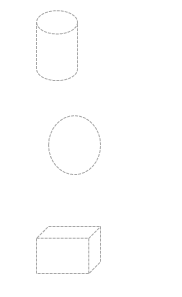
Lesson 10.1 Three-Dimensional Shapes
Essential Question How can you show which shapes stack, roll, or slide?
Listen and Draw
DIRECTIONS Place three-dimensional shapes on the page. Sort the shapes by whether they stack or do not stack. Describe the shapes. Match a picture of each shape to the shapes on the sorting mat. Glue the shape pictures on the sorting mat.
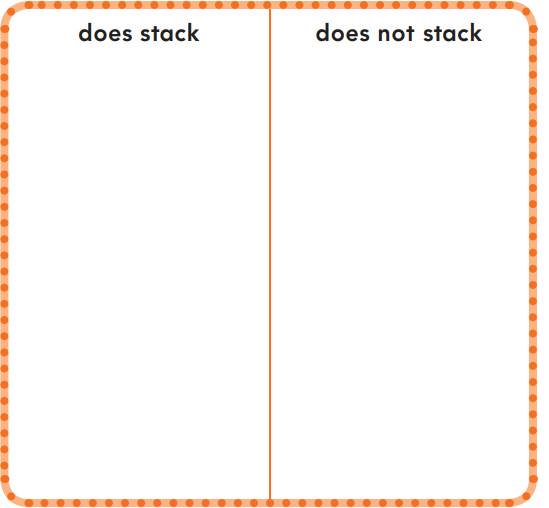
Answer:
The three-dimensional shapes that have a stack are a cylinder, prism, cube.
Explanation:
In the above-given question,
given that,
Place the three-dimensional shapes on the page.
sort the shapes by whether the stack does not stack.
the stack is a sphere, cylinder, prism.
does not stack is a sphere, cone. pyramid.
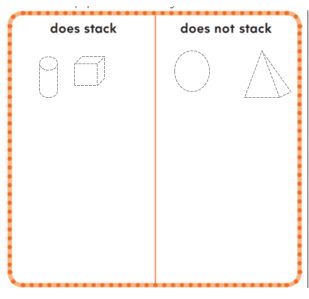
Share and Show
DIRECTIONS 1. Place three-dimensional shapes on the page. Sort the shapes by whether they roll or stack. Describe the shapes. Match a picture of each shape to the shapes. Glue the shape pictures on the page.
Question 1.
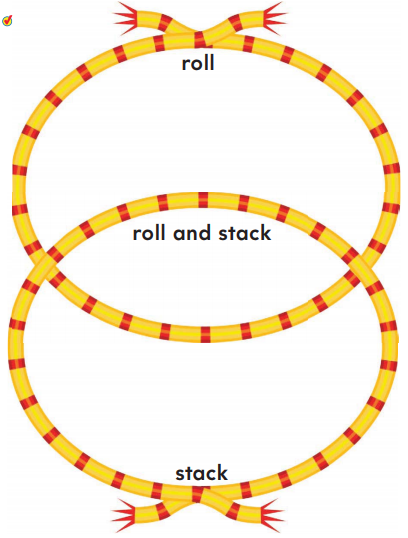
Answer:
The shapes that roll = cylinder and cone.
The shapes that roll and stack = cylinder and cube.
The shapes that stack = cylinder and cube.
Explanation:
In the above-given question,
given that,
The shapes that roll = cylinder and cone.
The shapes that roll and stack = cylinder and cube.
The shapes that stack = cylinder and cube.
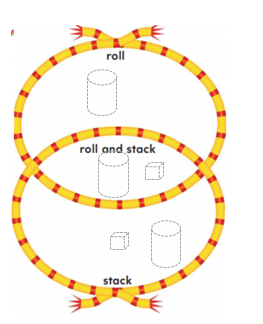
DIRECTIONS 2. Which shape does not roll? Mark an X on that shape. 3. Which shapes do not stack? Mark an X on those shapes. 4. Which shape does not slide? Mark an X on that shape. 5. Which shape does not stack and slide? Mark an X on that shape.
Question 2.

Answer:
The shape does not roll = prism.
Explanation:
In the above-given question,
given that,
the shapes does not roll = prism.
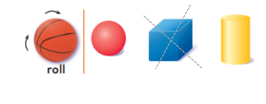
Question 3.

Answer:
The shape does not stack = cone and circle.
Explanation:
In the above-given question,
given that,
the shapes does not stack = cone and circle.

Question 4.

Answer:
The shape does not slide= prism.
Explanation:
In the above-given question,
given that,
the shapes does not slide = prism.
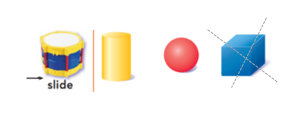
Question 5.

Answer:
The shape that stack and slide= prism and cylinder.
Explanation:
In the above-given question,
given that,
the shapes stack and slide = prism and cylinder.

Problem Solving • Applications
DIRECTIONS 6. I roll and do not stack. Describe the shape. Mark an X on that shape. 7. Draw to show what you know about a real object that rolls and does not stack.
Question 6.
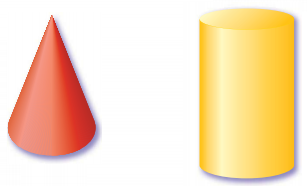
Answer:
The shape that rolls = cylinder.
Explanation:
In the above-given question,
given that,
the shapes that rolls = cylinder.
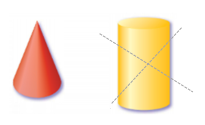
Question 7.
Answer:
The shape that rolls and do not stack = cone.
Explanation:
In the above-given question,
given that,
the shapes that rolls and do not stack = cone.
HOME ACTIVITY • Have your child identify and describe an object in the house that rolls and does not stack.
Three-Dimensional Shapes Homework & Practice 10.1
DIRECTIONS 1. Which shape does not roll? Mark an X on that shape. 2. Which shapes do not stack? Mark an X on those shapes. 3. Which shape does not slide? Mark an X on that shape. 4. Which shape does not stack and slide? Mark an X on that shape.
Question 1.

Answer:
The shape that does not rolls = prism.
Explanation:
In the above-given question,
given that,
the shapes that does not rolls = prism.

Question 2.

Answer:
The shape does not stack = sphere.
Explanation:
In the above-given question,
given that,
the shapes does not stack = sphere.

Question 3.

Answer:
The shape does not slide = sphere.
Explanation:
In the above-given question,
given that,
the shapes does not stack = sphere.

Question 4.

Answer:
The shape does not stack and slide = sphere.
Explanation:
In the above-given question,
given that,
the shapes does not stack and slide = sphere.
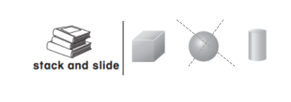
DIRECTIONS 1. Which shape does not roll? Mark an X on the shape. 2. Count forward. Trace and write the numbers in order. 3. Which shape has a curve? Color the shape.
Lesson Check
Question 1.

Answer:
The shape that does not rolls = prism.
Explanation:
In the above-given question,
given that,
the shapes that does not rolls = prism.

Spiral Review
Question 2.

Answer:
The number is 20.
Explanation:
In the above-given question,
given that,
The numbers are 16 and 18.
The number is 20.

Question 3.

Answer:
The shape that has the curve = sphere.
Explanation:
In the above-given question,
given that
the shape that has the curve = sphere.

Lesson 10.2 Identify, Name, and Describe Spheres
Essential Question How can you identify, name, and describe spheres?
Listen and Draw
DIRECTIONS Place three-dimensional shapes on the page. Identify and name the sphere. Sort the shapes on the sorting mat. Describe the sphere. Match a picture of each shape to the shapes on the sorting mat. Glue the shape pictures on the sorting mat.
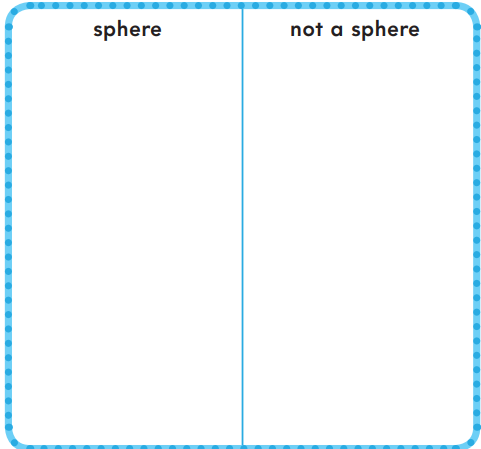
Answer:
The shape that does not sphere = prism.
Explanation:
In the above-given question,
given that,
the shapes that does not sphere = prism.
Answer:
The shape that forms a sphere = cone, and cylinder.
Explanation:
In the above-given question,
given that,
the shapes that form a sphere = cone and cylinder.
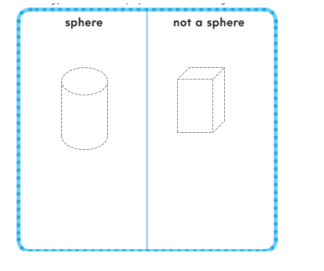
Share and Show
DIRECTIONS 1. Look at the sphere. Circle the words that describe a sphere. 2. Color the spheres.
Question 1.
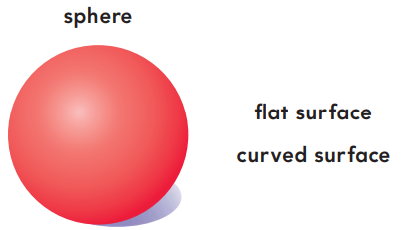
Answer:
The sphere has a flat surface.
Explanation:
In the above-given question,
given that,
the shape is a sphere.
The sphere has a flat surface.
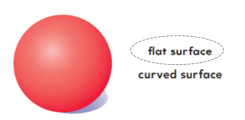
Question 2.
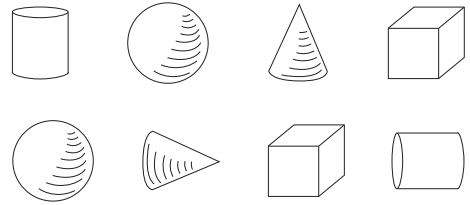
Answer:
The shapes are cone, prism, cylinder, and prism.
Explanation:
In the above-given question,
given that,
color the shapes.
The shapes are cone, prism, cylinder, and prism.
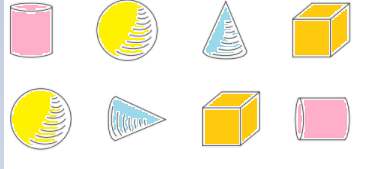
DIRECTIONS 3. Identify the objects that are shaped like a sphere. Mark an X on those objects.
Question 3.
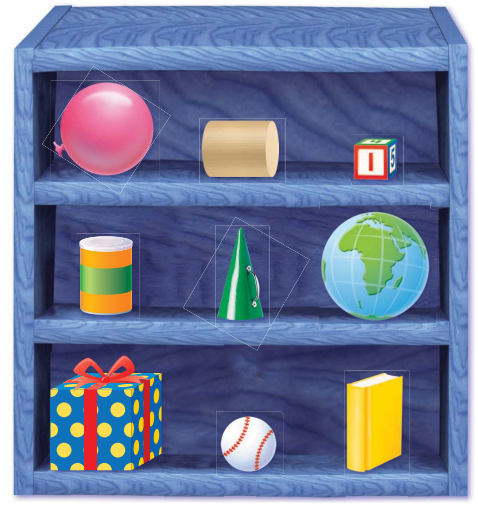
Answer:
The objects that are in sphere shape = globe, ball, and balloon.
Explanation:
In the above-given question,
given that,
Identify the objects that are shaped like a sphere.
The objects that are in sphere shape = globe, ball, and balloon.
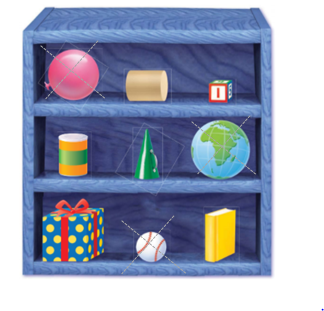
Problem Solving • Applications
DIRECTIONS 4. I have a curved surface. Which shape am I? Mark an X on that shape. 5. Draw to show what you know about a real object that is shaped like a sphere.
Question 4.
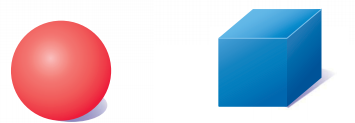
Answer:
The shape is a square prism.
Explanation:
In the above-given question,
given that,
The shapes are sphere and prism.
The shape is a square prism.

Question 5.
Answer:
The shape is a sphere.
Explanation:
In the above-given question,
given that,
The shapes are sphere and prism.
The shape is a sphere.

HOME ACTIVITY • Have your child identify and describe an object in the house that is shaped like a sphere.
Identify, Name, and Describe Spheres Homework & Practice 10.2
DIRECTIONS 1. Identify the objects that are shaped like a sphere. Mark an X on those objects.
Question 1.
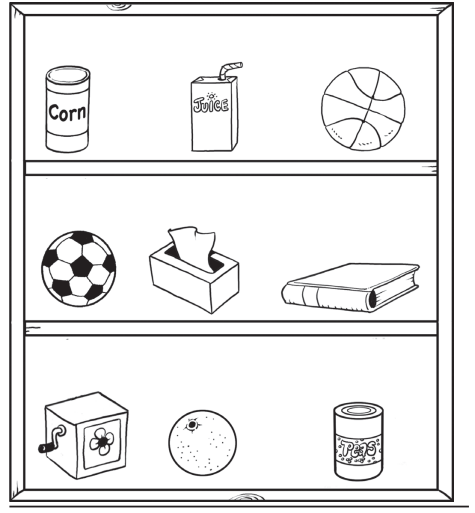
Answer:
The objects that are in sphere shape = ball, and orange.
Explanation:
In the above-given question,
given that,
Identify the objects that are shaped like a sphere.
The objects that are in sphere shape = ball, and orange.
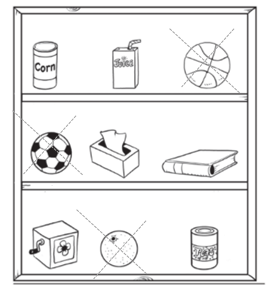
DIRECTIONS 1. Which shape is a sphere? Mark an X on the shape. 2. Which shape is a square? Color the square. 3. How many school buses are there? Write the number.
Lesson Check
Question 1.

Answer:
The shape is a sphere.
Explanation:
In the above-given question,
given that,
The shapes are sphere.
The shape is a sphere.

Spiral Review
Question 2.

Answer:
The shape is a square.
Explanation:
In the above-given question,
given that,
The shapes are square.
The shape is a square.

Question 3.

Answer:
The number of school buses = 6.
Explanation:
In the above-given figure,
given that,
There are 6 school buses.
the number of school buses = 6.
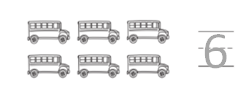
Lesson 10.3 Identify, Name, and Describe Cubes
Essential Question How can you identify, name, and describe cubes?
Listen and Draw
DIRECTIONS Place three-dimensional shapes on the page. Identify and name the cube. Sort the shapes on the sorting mat. Describe the cube. Match a picture of each shape to the shapes on the sorting mat. Glue the shape pictures on the sorting mat.
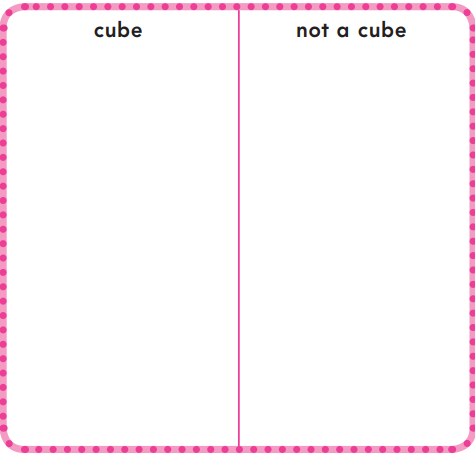
Answer:
The shape is a cube.
Explanation:
In the above-given question,
given that,
the shapes that are not cubes are square prism, triangular prism, and pentagonal prism.
The shape is a cube.
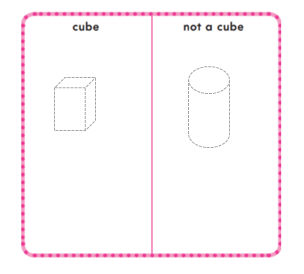
Share and Show
DIRECTIONS 1. Look at the cube. Circle the words that describe a cube. 2. Use a cube to count how many flat surfaces. Write the number.
Question 1.
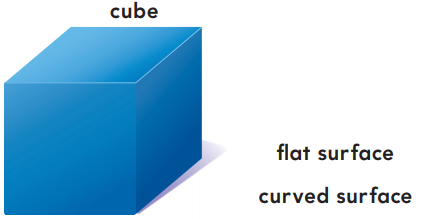
Answer:
The cube has a flat surface.
Explanation:
In the above-given question,
given that,
the cube has a flat surface.
The cube has a flat surface.
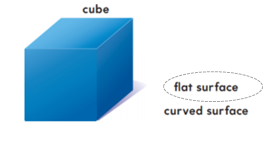
Question 2.
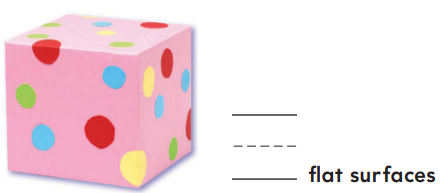
Answer:
The flat surfaces = 6.
Explanation:
In the above-given question,
given that,
The flat surfaces of a cube = 6.
The cube has flat surfaces = 6.
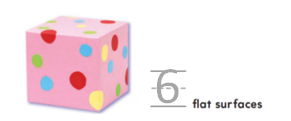
DIRECTIONS 3. Identify the objects that are shaped like a cube. Mark an X on those objects.
Question 3.
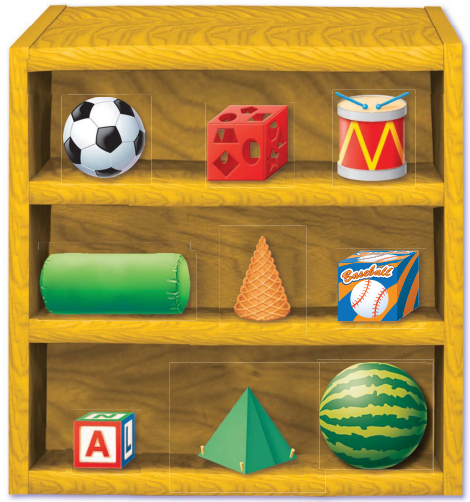
Answer:
The objects that are in cube shape = 3.
Explanation:
In the above-given question,
given that,
Identify the objects that are shaped like a cube.
The objects that are in cube shape = 3.
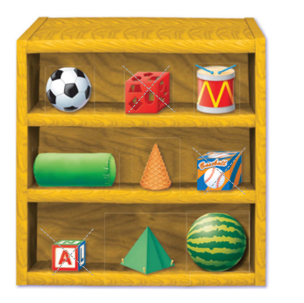
Problem Solving • Applications
DIRECTIONS 4. I have 6 flat surfaces. Which shape am I? Mark an X on that shape. 5. Draw to show what you know about a real object that is shaped like a cube.
Question 4.
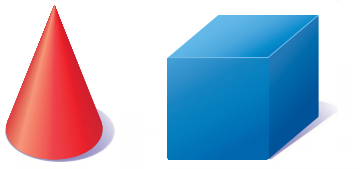
Answer:
The cube has flat surfaces = 6.
Explanation:
In the above-given question,
given that,
The flat surfaces of a cube = 6.
The cube has flat surfaces = 6.
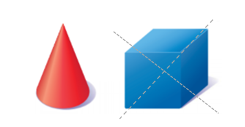
Question 5.
Answer:
The cube has flat surfaces = 6.
Explanation:
In the above-given question,
given that,
The flat surfaces of a cube = 6.
The cube has flat surfaces = 6.
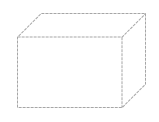
HOME ACTIVITY • Have your child identify and describe an object in the house that is shaped like a cube.
Identify, Name, and Describe Cubes Homework & Practice 10.3
DIRECTIONS 1. Identify the objects that are shaped like a cube. Mark an X on those objects.
Question 1.
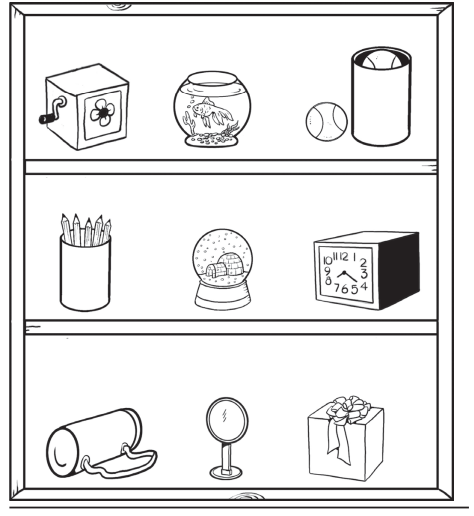
Answer:
The objects that are in cube shape = 3.
Explanation:
In the above-given question,
given that,
Identify the objects that are shaped like a cube.
The objects that are in cube shape = 3.
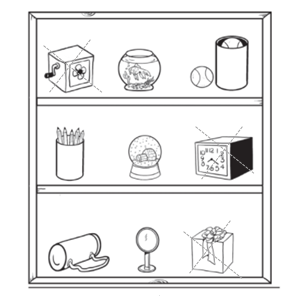
DIRECTIONS 1. Which shape is a cube? Mark an X on the shape. 2. How many sides does the square have? Write the number. 3. Begin with 81 and count forward to 90. What is the next number? Draw a line under that number.
Lesson Check
Question 1.

Answer:
The shape is a cube.
Explanation:
In the above-given question,
given that,
the shapes that are not cubes are a square prism, triangular prism, and pentagonal prism.
The shape is a cube.

Spiral Review
Question 2.

_________
_ _ _ _ _ _ _
_________
Answer:
The number of sides = 4.
Explanation:
In the above-given question,
given that,
the square has 4 sides.
The number of sides = 4.

Question 3.
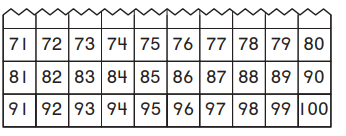
Answer:
The next numbers are 82, 83, 84, 85, 86, 87, 88, 89, and 90.
Explanation:
In the above-given question,
given that,
Begin with 81 and count forward to 90.
The numbers are 82, 83, 84, 85, 86, 87, 88, 89, and 90.

Lesson 10.4 Identify, Name, and Describe Cylinders
Essential Question How can you identify, name, and describe cylinders?
Listen and Draw
DIRECTIONS Place three-dimensional shapes on the page. Identify and name the cylinder. Sort the shapes on the sorting mat. Describe the cylinder. Match a picture of each shape to the shapes on the sorting mat. Glue the shape pictures on the sorting mat.
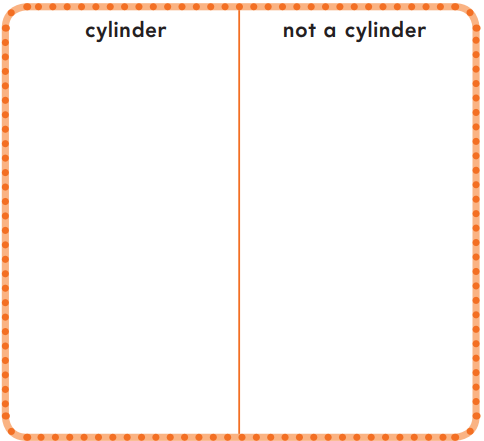
Answer:
The shape is a cylinder.
Explanation:
In the above-given question,
given that,
the shapes that are not cylinders are a square prism, triangular prism, and pentagonal prism.
The shape is a cylinder.
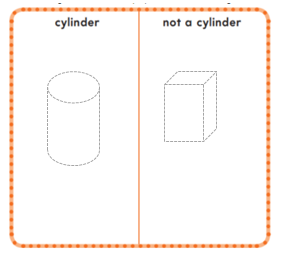
Share and Show
DIRECTIONS 1. Look at the cylinder. Circle the words that describe a cylinder. 2. Use a cylinder to count how many flat surfaces. Write the number.
Question 1.
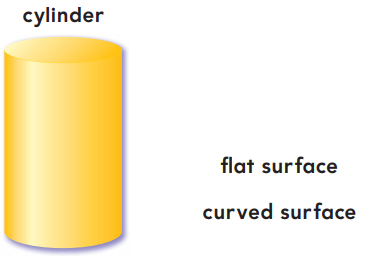
Answer:
The cylinder has a flat and curved surface.
Explanation:
In the above-given question,
given that,
the cylinder has a flat surface.
The cylinder has a curved surface.
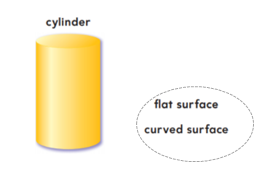
Question 2.
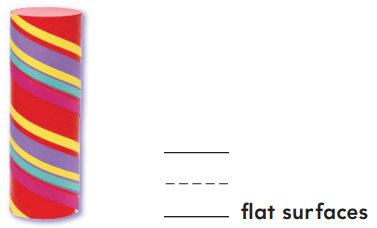
Answer:
The cylinder has a flat and curved surface.
Explanation:
In the above-given question,
given that,
the cylinder has a flat surface.
The cylinder has a curved surface.
The number of flat surfaces = 2.
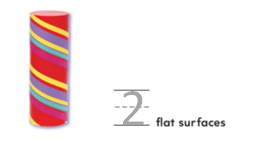
DIRECTIONS 3. Identify the objects that are shaped like a cylinder. Mark an X on those objects.
Question 3.
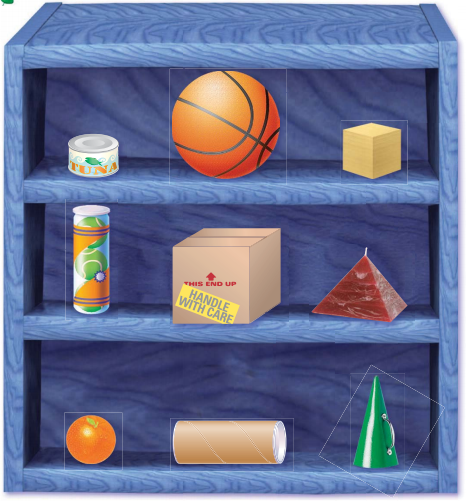
Answer:
The objects that are in cylinder shape = 3.
Explanation:
In the above-given question,
given that,
Identify the objects that are shaped like a cylinder.
The objects that are in cylinder shape = 3.
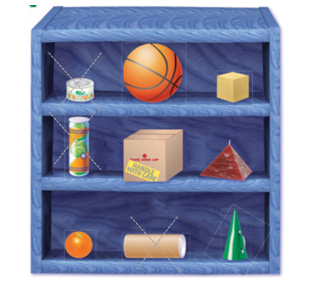
Problem Solving • Applications
DIRECTIONS 4. I have 2 flat surfaces. Which shape am I? Mark an X on that shape. 5. Draw to show what you know about a real object that is shaped like a cylinder.
Question 4.
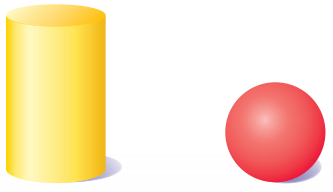
Answer:
The cylinder has a flat and curved surface.
Explanation:
In the above-given question,
given that,
the cylinder has a flat surface.
The cylinder has a curved surface.
The number of flat surfaces = 2.
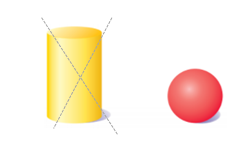
Question 5.
Answer:
The cylinder has a flat and curved surface.
Explanation:
In the above-given question,
given that,
the cylinder has a flat surface.
The cylinder has curved surface.
The number of flat surfaces = 2.

HOME ACTIVITY • Have your child identify and describe an object in the house that is shaped like a cylinder.
Identify, Name, and Describe Cylinders Homework & Practice 10.4
DIRECTIONS 1. Identify the objects that are shaped like a cylinder. Mark an X on those objects.
Question 1.
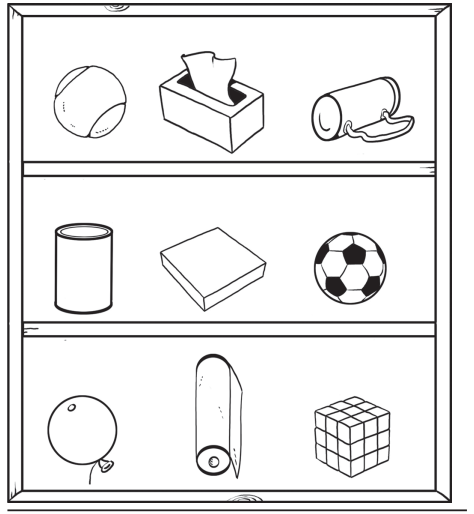
Answer:
The objects that are in cylinder shape = 3.
Explanation:
In the above-given question,
given that,
Identify the objects that are shaped like a cylinder.
The objects that are in cylinder shape = 3.
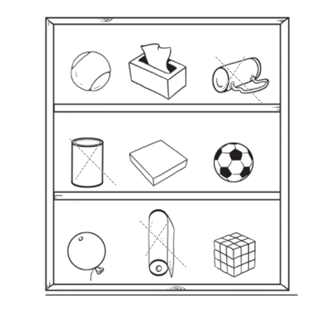
DIRECTIONS 1. Which shape is a cylinder? Mark an X on the shape. 2. How many vertices does the triangle have? Write the number. 3. Write the number to show how many are being taken from the set.
Lesson Check
Question 1.

Answer:
The shape is a cylinder.
Explanation:
In the above-given question,
given that,
the shapes that are not cylinders are a square prism, triangular prism, and pentagonal prism.
The shape is a cylinder.

Spiral Review
Question 2.

Answer:
The number of vertices = 3.
Explanation:
In the above-given question,
given that,
the triangle has 3 vertices.
The number of vertices = 3.

Question 3.
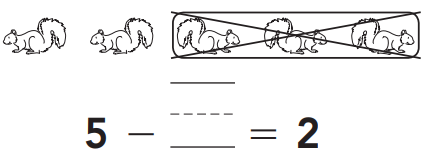
Answer:
The number of rabbits = 3.
Explanation:
In the above-given question,
given that,
there are 5 rabbits and 3 runs away.
The number of rabbits = 3.
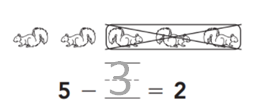
Lesson 10.5 Identify, Name, and Describe Cones
Essential Question How can you identify, name, and describe cones?
Listen and Draw
DIRECTIONS Place three-dimensional shapes on the page. Identify and name the cone. Sort the shapes on the sorting mat. Describe the cone. Match a picture of each shape to the shapes on the sorting mat. Glue the shape pictures on the sorting mat.
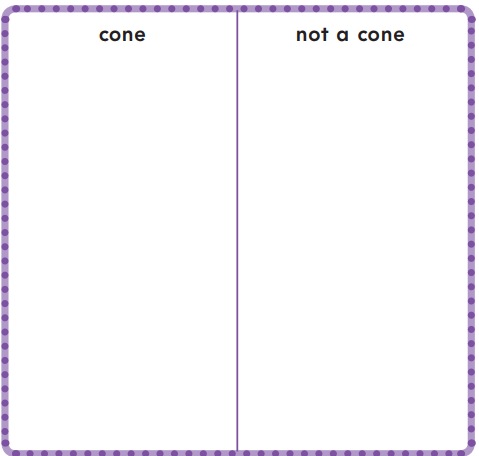
Answer:
The shape is a cone.
Explanation:
In the above-given question,
given that,
the shapes that are not cones are a square prism, triangular prism, and pentagonal prism.
The shape is a cone.
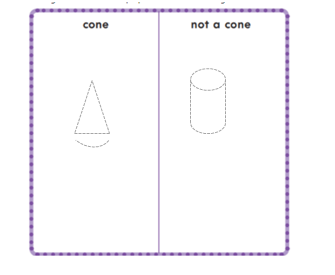
Share and Show
DIRECTIONS 1. Look at the cone. Circle the words that describe a cone. 2. Use a cone to count how many flat surfaces. Write the number.
Question 1.
cone
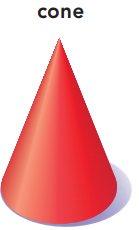
flat surface
curved surface
Answer:
The cone has a flat and curved surface.
Explanation:
In the above-given question,
given that,
the cone has a flat surface.
The cone has a curved surface.
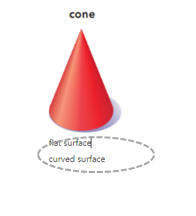
Question 2.
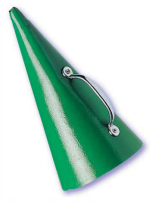
________
_ _ _ _ _ _
________ flat surface
Answer:
The cylinder has a flat and curved surface.
Explanation:
In the above-given question,
given that,
the cone has a flat surface.
The cone has a curved surface.
The number of flat surfaces = 1.
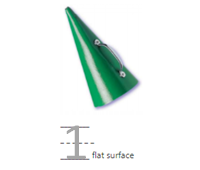
DIRECTIONS 3. Identify the objects that are shaped like a cone. Mark an X on those objects.
Question 3.
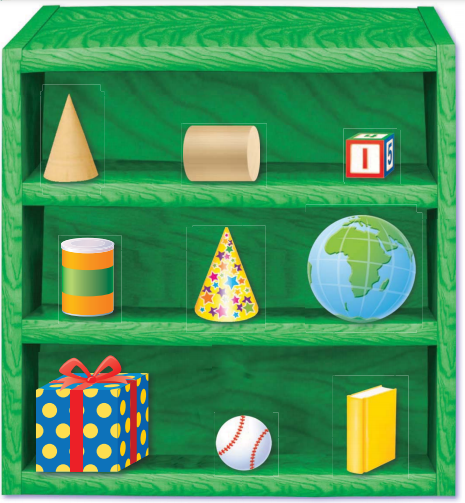
Answer:
The objects that are in cone shape = 2.
Explanation:
In the above-given question,
given that,
Identify the objects that are shaped like a cone.
The objects that are in cone shape = 2.
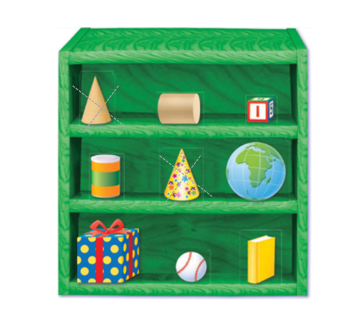
HOME ACTIVITY • Have your child identify and describe an object in the house that is shaped like a cone.
Identify, Name, and Describe Cones Homework & Practice 10.5
DIRECTIONS 1. Identify the objects that are shaped like a cone. Mark an X on those objects.
Question 1.
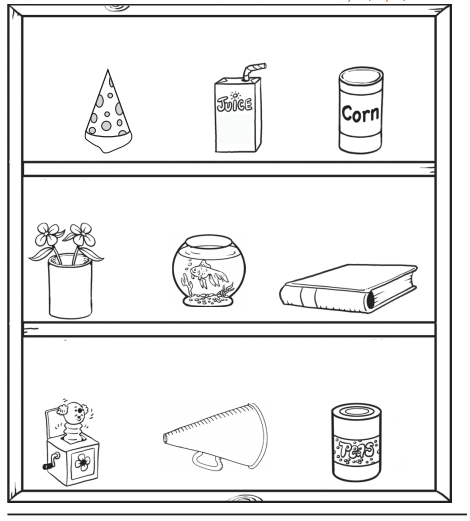
Answer:
The objects that are in cone shape = 2.
Explanation:
In the above-given question,
given that,
Identify the objects that are shaped like a cone.
The objects that are in cone shape = 2.
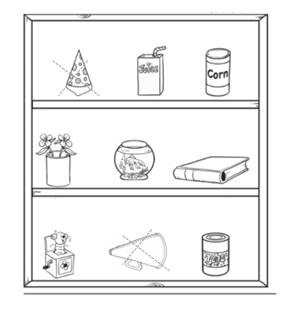
DIRECTIONS 1. Which shape is a cone? Mark an X on the shape. 2. Count and tell how many. Write the number. 3. Which shape is a circle? Color the circle.
Lesson Check
Question 1.

Answer:
The shape is a cone.
Explanation:
In the above-given question,
given that,
the shapes that are not cone are a square prism, triangular prism, and pentagonal prism.
The shape is a cone.

Spiral Review
Question 2.

Answer:
The number of buttons = 13.
Explanation:
In the above-given question,
given that,
there are 13 buttons.
The number of buttons = 13.

Question 3.

Answer:
The shape is a circle.
Explanation:
In the above-given question,
given that,
the shapes that are not circled are a square prism, triangular prism, and pentagonal prism.
The shape is a circle.

Identify and Describe Three-Dimensional Shapes Mid-Chapter Checkpoint
Concepts and Skills
DIRECTIONS 1. Mark an X on the object that is shaped like a cylinder. (K.G.A.2) 2. Color the sphere. (K.G.A.2) 3. Color the cube. (K.G.A.2) 4. Draw lines to match the objects to their shapes. (K.G.A.2)
Question 1.

Answer:
The shape is a cylinder.
Explanation:
In the above-given question,
given that,
the shapes that are not cylinders are a square prism, triangular prism, and pentagonal prism.
The shape is a cylinder.
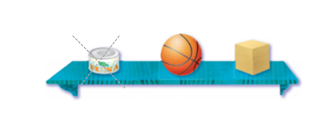
Question 2.

Answer:
The shape is a sphere.
Explanation:
In the above-given question,
given that,
the shapes that are not spheres are a square prism, triangular prism, and pentagonal prism.
The shape is a sphere.

Question 3.

Answer:
The shape is a cube.
Explanation:
In the above-given question,
given that,
the shapes that are not cubes are a square prism, triangular prism, and pentagonal prism.
The shape is a cube.

Question 4.
THINK SMARTER
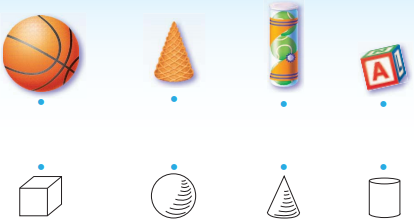
Answer:
The objects are sphere, cylinder, cone, and cube.
Explanation:
In the above-given question,
given that,
The number of objects = 4.
The objects are sphere, cylinder, cone, and cube.
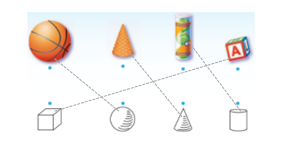
Lesson 10.6 Problem Solving • Two- and Three-Dimensional Shapes
Essential Question How can you solve problems using the strategy use logical reasoning?
Unlock the Problem
DIRECTIONS Place shapes on the page. Sort the shapes on the sorting mat into sets of two-dimensional and three-dimensional shapes. Match a picture of each shape to a shape on the sorting mat. Glue the shape
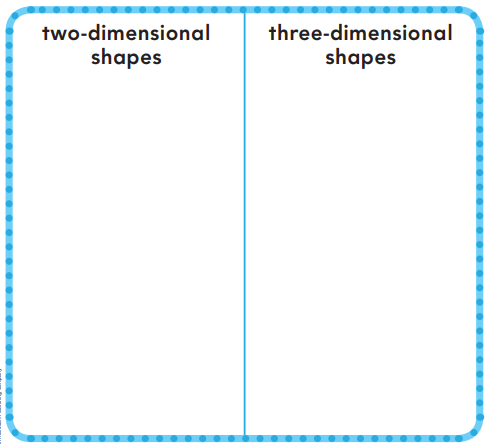
Answer:
The two-dimensional shapes = circle, triangle, square, rectangle, and so on.
Explanation:
In the above-given question,
given that,
The two-dimensional shapes = circle, triangle, square, rectangle, and so on.
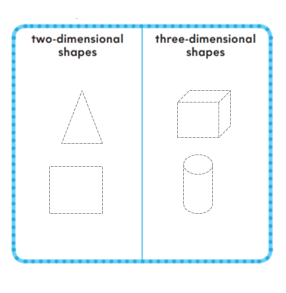
Try Another Problem
DIRECTIONS 1. Identify the two-dimensional or flat shapes. Trace the circle around the square. Circle the other flat shapes. Identify the three-dimensional or solid shapes. Trace the X on the sphere. Mark an X on the other solid shapes.
Question 1.
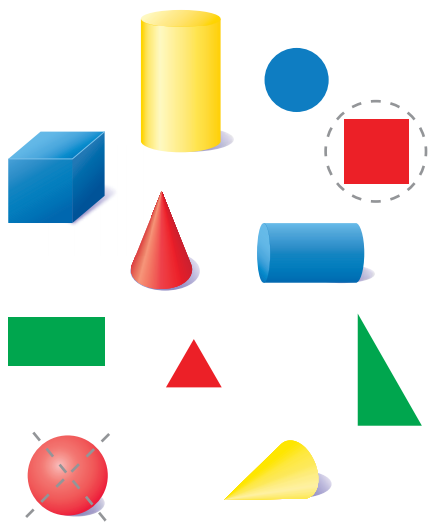
Answer:
The two-dimensional shapes = circle, triangle, square, rectangle, and so on.
Explanation:
In the above-given question,
given that,
The two-dimensional shapes = circle, triangle, square, rectangle, and so on.
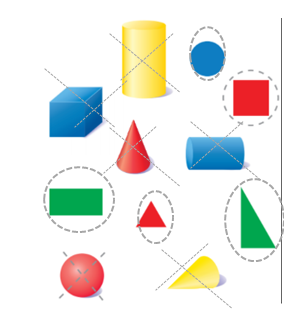
Share and Show
DIRECTIONS 2. Identify the two-dimensional or flat shapes. Use red to color the flat shapes. Identify the three-dimensional or solid shapes. Use blue to color the solid shapes.
Question 2.
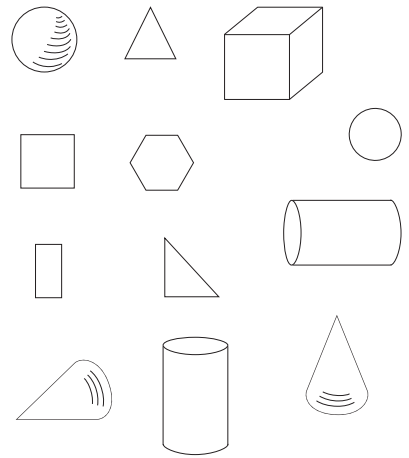
Answer:
The two-dimensional shapes = circle, triangle, square, rectangle, hexagon, and so on.
Explanation:
In the above-given question,
given that,
The two-dimensional shapes = circle, triangle, square, rectangle, hexagon, and so on
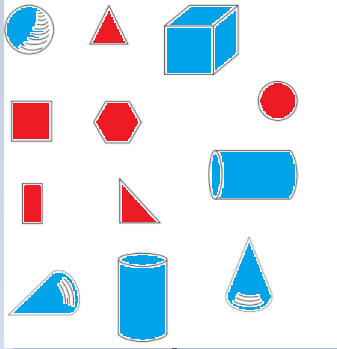
On Your Own
DIRECTIONS 3. Draw to show what you know about a flat shape. Name the shape. 4. Draw to show what you know about a real object that has a solid shape. Name the object and the shape.
Question 3.
Answer:
The object that has a flat shape = circle.
Explanation:
In the above-given question,
given that,
show about a flat shape.
The object has a flat shape = circle.
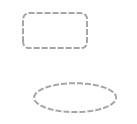
Question 4.
Answer:
The object that has a solid shape = sphere.
Explanation:
In the above-given question,
given that,
show about a solid shape.
The object has a solid shape = sphere.
HOME ACTIVITY • Have your child identify a household object that is shaped like a three-dimensional shape. Have him or her name the three-dimensional shape.
Problem Solving • Two- and Three-Dimensional Shapes Homework & Practice 10.6
DIRECTIONS 1. Identify the two-dimensional or flat shapes. Use red to color the flat shapes. Identify the three-dimensional or solid shapes. Use blue to color the solid shapes.
Question 1.
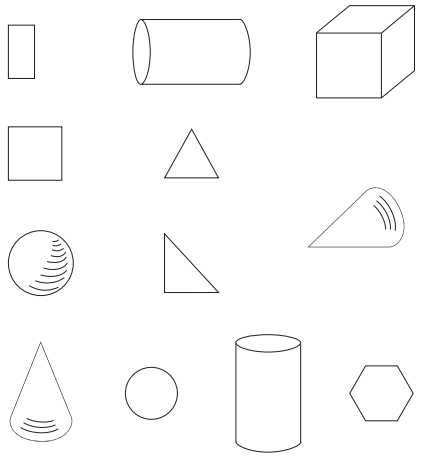
Answer:
The two-dimensional shapes = circle, triangle, square, rectangle, hexagon, and so on.
Explanation:
In the above-given question,
given that,
The two-dimensional shapes = circle, triangle, square, rectangle, hexagon, and so on
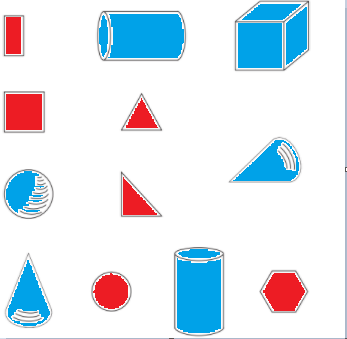
DIRECTIONS 1. Which is a three-dimensional or solid shape? Mark an X on the shape. 2. Join two triangles to make the shape. Draw and color the triangles you used. 3. Begin with 1 and count forward to 19. What is the next number? Draw a line under that number.
Lesson Check
Question 1.

Answer:
The three-dimensional shape = prism.
Explanation:
In the above-given question
The shape is a prism.
The three-dimensional shape = prism.
![]()
Spiral Review
Question 2.
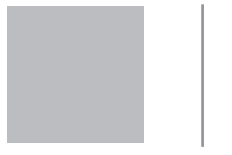
Answer:
The two triangles joined = square.
Explanation:
In the above-given question,
given that,
The two triangles joined = square.
The two triangles joined = square.

Question 3.
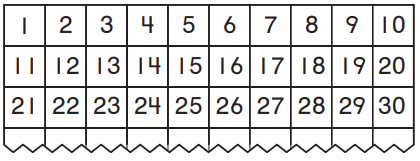
Answer:
The numbers are 2, 3, 4, 5, 6, 7, 8, 9, 10, 11, 12, 13, 14, 15, 16, 17, and 18.
Explanation:
In the above-given question,
given that,
Begin with 1 and forward to 19.
The numbers are 2, 3, 4, 5, 6, 7, 8, 9,10, 11, 12, 13, 14, 15, 16, 17, and 18.
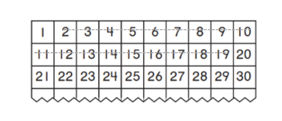
Lesson 10.7 Model Shapes
Essential Question How can you model shapes in the real world?
Listen and Draw
DIRECTIONS Use your finger to trace around the shape. Name the shape. Tell a friend whether this shape is flat or solid. Talk about the number of sides and the number of vertices.
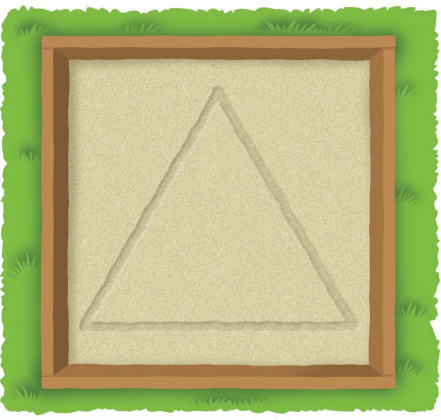
Answer:
The shape is a triangle.
It has a flat surface.
Explanation:
In the above-given question,
given that,
The shape is a triangle.
It has a flat surface.
Share and Show
DIRECTIONS 1. Use clay to model 4 spheres as shown. 2. Place straws into the spheres as shown.
Question 1.
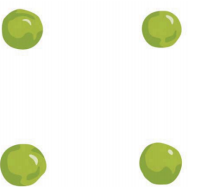
Answer:
The number of spheres = 4.
Explanation:
In the above-given figure,
given that,
There are 4 spheres.
the number of spheres = 4.
Question 2.
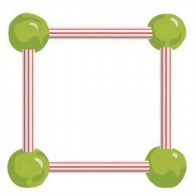
Answer:
The number of straws = 4.
Explanation:
In the above-given figure,
given that,
There are 4 straws.
the number of straws = 4.
DIRECTIONS 3. Use clay and straws to model another shape. Match the shape that you modeled in Exercise 2. 4. Stand a straw into each corner of one of the shapes. Carefully lift the other shape and place it onto the straws as shown. Name the solid shape you modeled.
Question 3.
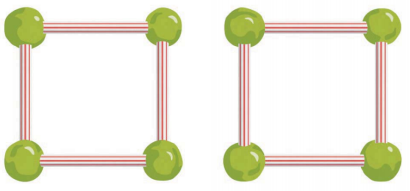
Answer:
The number of squares = 2.
The shape is a rectangle.
Explanation:
In the above-given figure,
given that,
There are 2 squares.
if we join them it forms a rectangle.
the number of squares = 2.
the shape is a rectangle.
Question 4.
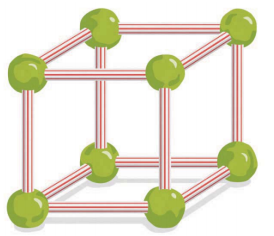
Answer:
The solid shape is a prism.
Explanation:
In the above-given question,
given that,
the shape is a prism.
the solid shape is a prism.
Problem Solving • Applications
DIRECTIONS 5. Maria’s window has the shape of a square. Draw a picture of the shape. Tell a friend whether this shape is flat or solid. Talk about the number of sides and the number of vertices. 6. Use objects such as clay, straws, and circles to model a solid shape. Draw a picture of the solid shape. Tell a friend about the shape.
Question 5.
Answer:
The number of sides = 4.
The number of vertices = 4.
Explanation:
In the above-given figure,
given that,
The square has 4 sides and 4 vertices.
the number of sides = 4.
The number of vertices = 4.
Question 6.
Answer:
The solid shape is a prism.
Explanation:
In the above-given question,
given that,
the shape is a prism.
the solid shape is a prism.
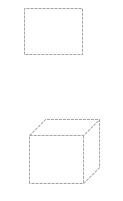
Model Shapes Homework & Practice 10.7
DIRECTIONS 1. Draw to show what you know about a square. Write how many sides. 2. Use clay to model a cylinder. How many flat surfaces are there?
Question 1.
_________
_ _ _ _ _ _ _
__________ sides
Answer:
The number of sides = 4.
The number of vertices = 4.
Explanation:
In the above-given figure,
given that,
The square has 4 sides and 4 vertices.
the number of sides = 4.
The number of vertices = 4.

Question 2.
_________
_ _ _ _ _ _ _
__________ flat surfaces
Answer:
The cylinder has a flat and curved surface.
Explanation:
In the above-given question,
given that,
the cylinder has a flat surface.
The cylinder has a curved surface.
The number of flat surfaces = 2.

DIRECTIONS 1. How many flat surfaces does this shape have? Write the number. 2. Which shape is flat? Color the flat shape. 3. Tell an addition word problem about the boats. Write the number to complete the addition sentence.
Lesson Check
Question 1.

_________
_ _ _ _ _ _ _
__________ flat surfaces
Answer:
The cone has a flat and curved surface.
Explanation:
In the above-given question,
given that,
the cylinder has a flat surface.
The cylinder has a curved surface.
The number of flat surfaces = 1.

Spiral Review
Question 2.

Answer:
The flat shape is a triangle.
Explanation:
In the above-given question,
given that,
The shapes are prism, triangle, sphere, and cylinder.
The flat shape is a triangle.

Question 3.
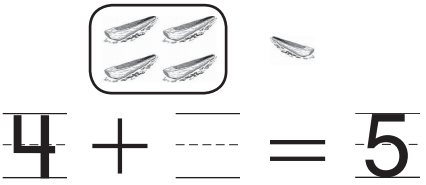
Answer:
The number of boats = 5.
Explanation:
In the above-given question,
given that,
the number of boats = 4 + 1 = 5.
the number of boats = 5.
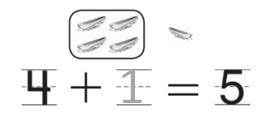
Lesson 10.8 Above and Below
Essential Question How can you use the terms above and below to describe shapes in the environment?
Listen and Draw
DIRECTIONS Trace the circle around the object shaped like a cylinder that is below the shelf. Trace the X on the object shaped like a sphere that is above the cabinet.
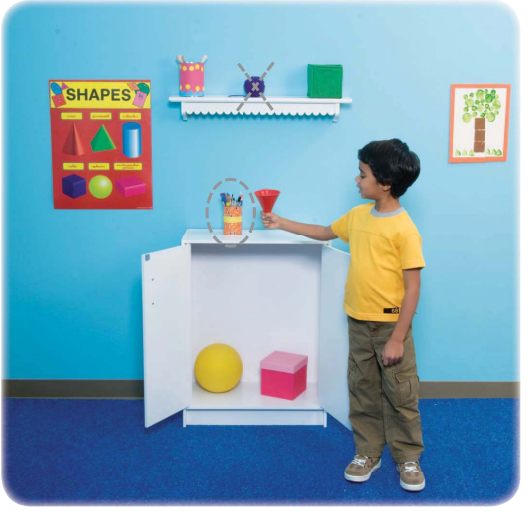
Answer:
The object shaped like a cylinder that is below the shelf.
Explanation:
In the above-given question,
given that,
The object shaped like a cylinder that is below the shelf.
Share and Show
DIRECTIONS 1. Circle the object that is shaped like a cone below the play set. Mark an X on the object that is shaped like a cube above the play set. Color the object that is shaped like a cylinder above the play set.
Question 1.
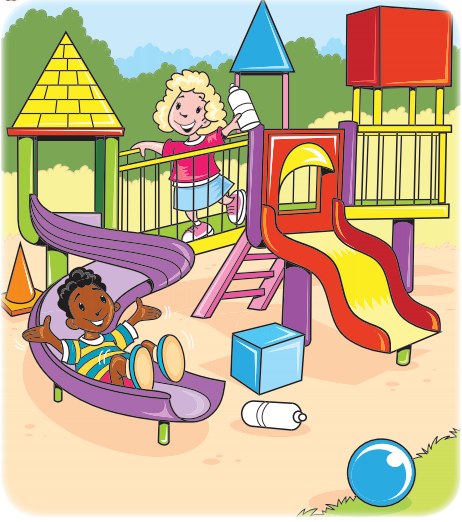
Answer:
The object cone is below the playset.
The object cube is above the playset.
The object cylinder is above the playset.
Explanation:
In the above-given question,
given that,
The objects in the playset.
The object cone is below the playset.
The object cube is above the playset.
The object cylinder is above the playset.
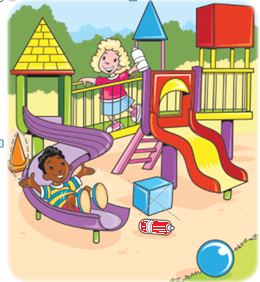
DIRECTIONS 2. Circle the ball that is above the net. Mark an X on the box that is directly below the net.
Question 2.
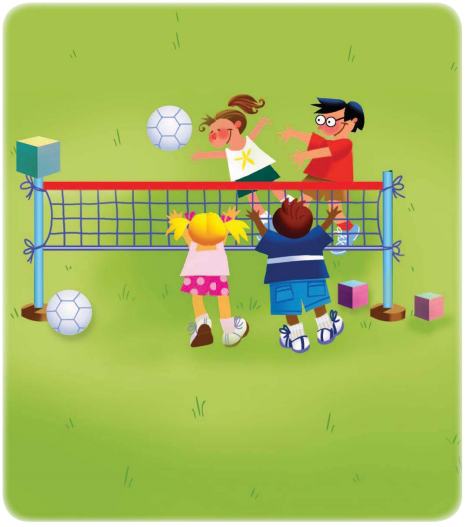
Answer:
The object ball is above the net.
the object ball is below the net.
Explanation:
In the above-given question,
given that,
the objects in the playground.
The object ball is above the net.
the object ball is below the net.
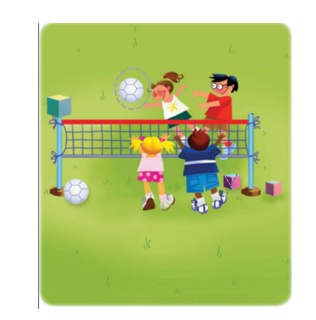
Problem Solving • Applications
DIRECTIONS 3. Draw to show what you know about real world three-dimensional objects that might be above or below the net. Tell a friend about your drawing as you name the shape of the objects.
Question 3.
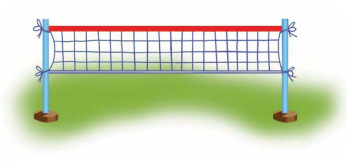
Answer:
The object ball is above the net.
the object ball is below the net.
Explanation:
In the above-given question,
given that,
the objects in the playground.
The object ball is above the net.
the object ball is below the net.

Above and Below Homework & Practice 10.8
DIRECTIONS 1. Mark an X on the object that is shaped like a sphere below the table. Circle the object that is shaped like a cube above the table.
Question 1.
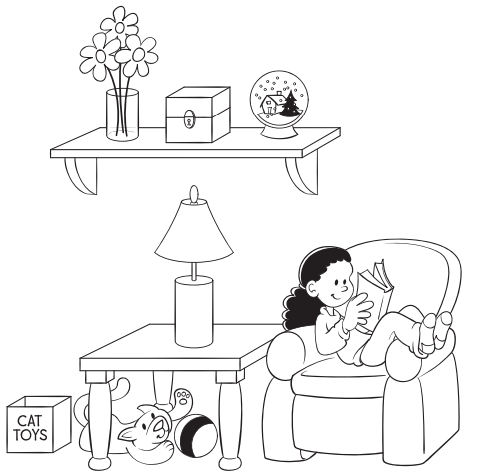
Answer:
The object sphere is below the table.
The object cube is above the table.
Explanation:
In the above-given question,
given that,
the objects in the house.
The object cube is above the table.
the object sphere is below the table.
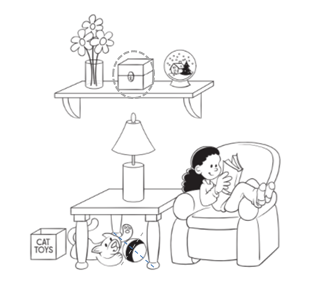
DIRECTIONS 1. Circle the set that shows an object shaped like a sphere above the object shaped like a cube. 2. Count and tell how many. Write the number. 3. How many vertices does the hexagon have? Write the number.
Lesson Check
Question 1.
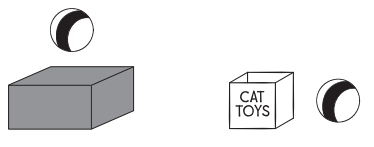
Answer:
The object sphere is above the cube.
Explanation:
In the above-given question,
given that,
the objects in the house.
The object sphere is above the cube.
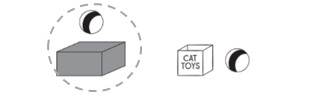
Spiral Review
Question 2.

Answer:
The number of cube sets = 2.
Explanation:
In the above-given figure,
given that,
the cubes are 2 sets.
the number of cube sets = 2.

Question 3.

Answer:
The number of vertices = 4.
Explanation:
In the above-given figure,
given that,
The hexagons have 4 vertices.
The number of vertices = 4.

Lesson 10.9 Beside and Next To
Essential Question How can you use the terms beside and next to to describe shapes in the environment?
Listen and Draw
DIRECTIONS Trace the X on the object shaped like a cone that is beside the object shaped like a sphere. Trace the circle on the object shaped like a sphere that is next to the object shaped like a cube.
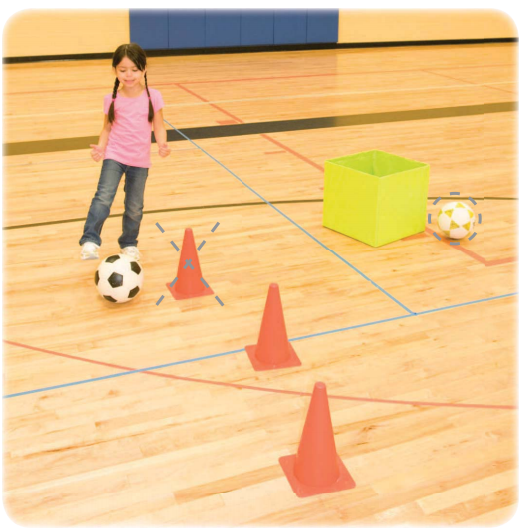
Answer:
The object cone is beside the sphere.
The object sphere is next to the cube.
Explanation:
In the above-given question,
given that,
The object cone is beside the sphere.
The object sphere is next to the cube.
Share and Show
DIRECTIONS 1. Mark an X on the bead shaped like a cube that is beside the bead shaped like a cone. Draw a circle around the bead shaped like a cone that is next to the bead shaped like a cylinder. Use the words next to and beside to name the position of other bead shapes.
Question 1.
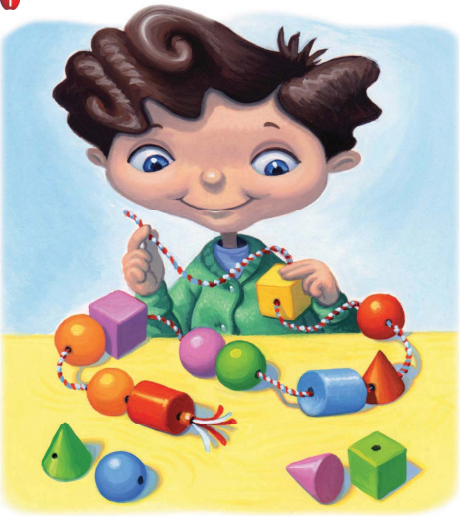
Answer:
The object bead shaped like a cube is beside the cone.
The object bead shaped like a cone is next to the cylinder.
The object bead shaped like a cube is beside the cone.
Explanation:
In the above-given question,
given that,
the bead-shaped objects.
The object bead shaped like a cube is beside the cone.
The object bead shaped like a cone is next to the cylinder.
The object bead shaped like a cube is beside the sphere.
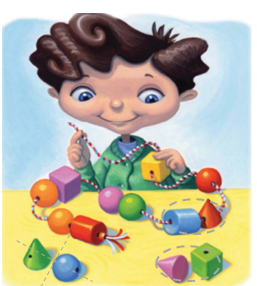
DIRECTIONS 2. Mark an X on the object shaped like a cylinder that is next to the object shaped like a sphere. Draw a circle around the object shaped like a cone that is beside the object shaped like a cube. Use the words next to and beside to describe the position of other package shapes.
Question 2.
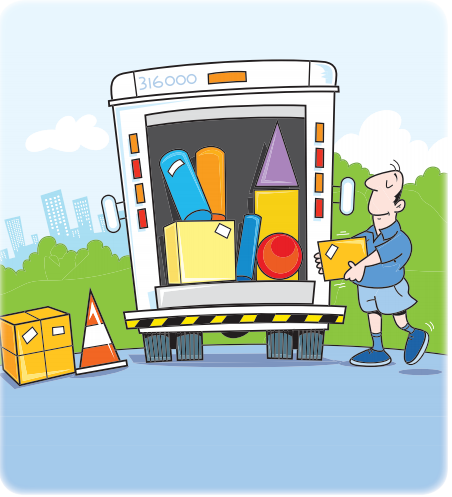
Answer:
The object cone is beside the cube.
The object cylinder is next to the sphere.
The object cylinder is above the cube.
Explanation:
In the above-given question,
given that,
The object cone is beside the cube.
The object cylinder is next to the sphere.
The object cylinder is above the cube.
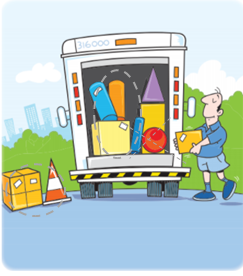
Problem Solving • Applications
DIRECTIONS 3. Draw or use pictures to show what you know about real world three-dimensional objects beside and next to other objects.
Question 3.
Answer:
The object cone is beside the cube.
The object cylinder is next to the sphere.
The object cylinder is above the cube.
Explanation:
In the above-given question,
given that,
The object cone is beside the cube.
The object cylinder is next to the sphere.
The object cylinder is above the cube.

HOME ACTIVITY • Tell your child you are thinking of something in the room that is beside or next to another object. Have your child tell you the shape of the object.
Beside and Next To Homework & Practice 10.9
DIRECTIONS 1. Mark an X on the object shaped like a cylinder that is next to the object shaped like a sphere. Circle the object shaped like a cone that is beside the object shaped like a cube. Use the words next to and besides to name the position of other shapes.
Question 1.
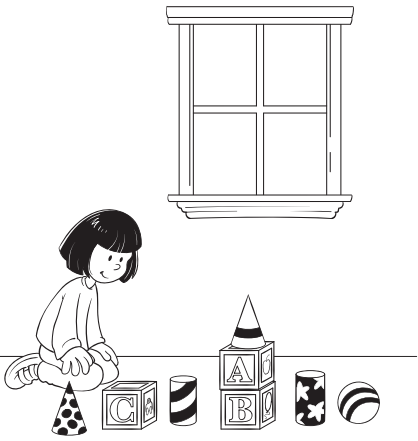
Answer:
The object cone is beside the cube.
The object cylinder is next to the sphere.
The object cone is above the cube.
Explanation:
In the above-given question,
given that,
The object cone is beside the cube.
The object cylinder is next to the sphere.
The object cone is above the cube.
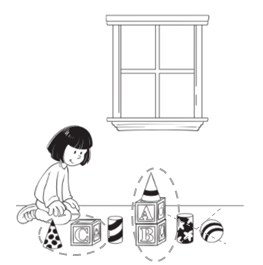
DIRECTIONS 1. Circle the set that shows an object shaped like a cube beside the object shaped like a cone. 2. Which shape is a hexagon? Color the hexagon. 3. How many tiles are there? Write the number.
Lesson Check
Question 1.
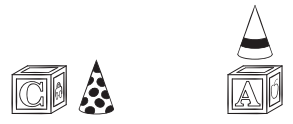
Answer:
The object cube is beside the cone.
Explanation:
In the above-given question,
given that,
the objects are cube and cone.
The object cube is beside the cone.
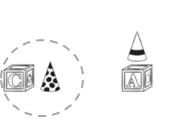
Spiral Review
Question 2.

Answer:
The shape is a hexagon.
Explanation:
In the above-given question,
given that,
the shapes are circle, hexagon, triangle, and rectangle.
The shape is a hexagon.

Question 3.
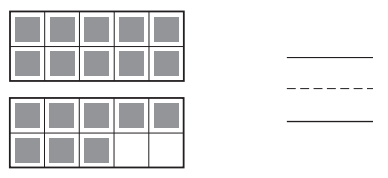
Answer:
The number of tiles = 18.
Explanation:
In the above-given question,
given that,
there are 2 sets of tiles.
10 + 8 = 18.
The number of tiles = 18.
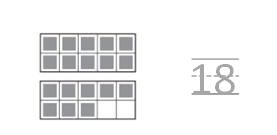
Lesson 10.10 In Front Of and Behind
Essential Question How can you use the terms in front of and behind to describe shapes in the environment?
Listen and Draw
DIRECTIONS Trace the X on the object shaped like a sphere that is in front of the object shaped like a cube. Trace the circle around the object shaped like a cylinder that is behind the object shaped like a cube.
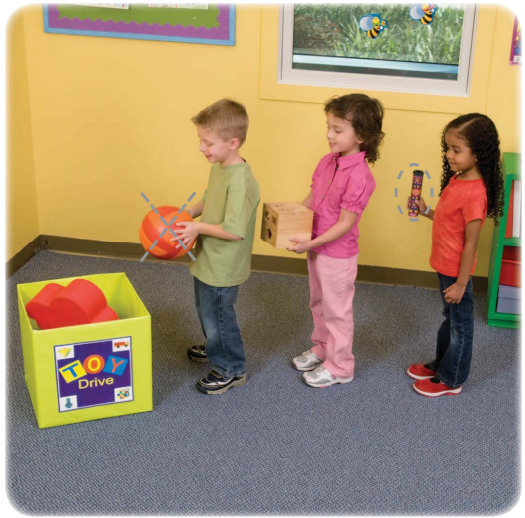
Answer:
The object sphere is in front of the cube.
The object cylinder is behind the cube.
Explanation:
In the above-given question,
given that,
The object sphere is in front of the cube.
The object cylinder is behind the cube.
Share and Show
DIRECTIONS 1. Mark an X on the object shaped like a cylinder that is behind the object shaped like a cube. Draw a circle around the object shaped like a sphere that is directly in front of the object shaped like a cone. Use the words in front of and behind to name the position of other shapes.
Question 1.
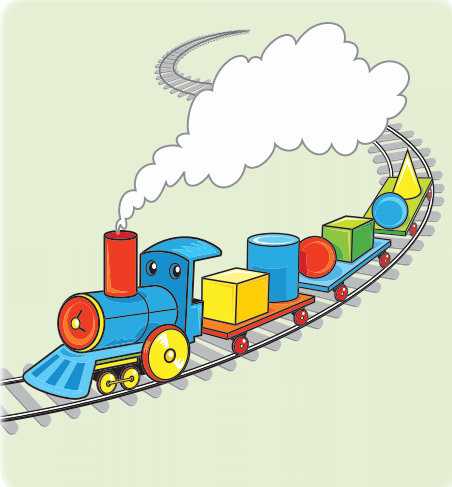
Answer:
The object cylinder is behind the cube.
The object sphere is in front of the cone.
The object sphere is in front of the cube.
Explanation:
In the above-given question,
given that,
The object cylinder is behind the cube.
The object sphere is in front of the cone.
The object sphere is in front of the cube.
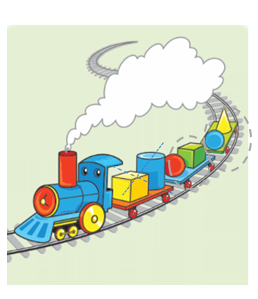
DIRECTIONS 2. Mark an X on the object shaped like a cube that is in front of the object shaped like a cylinder. Draw a circle around the object shaped like a cylinder that is behind the object shaped like a sphere. Use the words in front of and behind to name the position of other shaped objects.
Question 2.
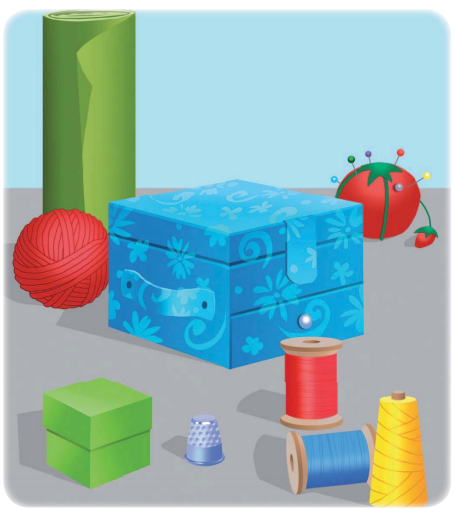
Answer:
The object cylinder is behind the sphere.
The object cube is in front of the cylinder.
The object cube is below the cube.
Explanation:
In the above-given question,
given that,
The object cylinder is behind the sphere.
The object cube is in front of the cylinder.
The object cube is below the cube.
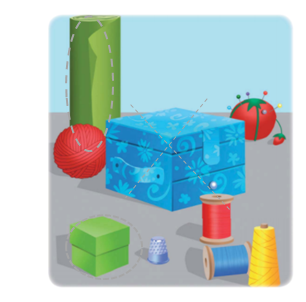
Problem Solving • Applications
DIRECTIONS 3. Draw or use pictures to show what you know about real world three dimensional objects in front of and behind other objects.
Question 3.
Answer:
The object cylinder is behind the sphere.
The object cube is in front of the cylinder.
The object cube is below the cube.
Explanation:
In the above-given question,
given that,
The object cylinder is behind the sphere.
The object cube is in front of the cylinder.
The object cube is below the cube.

HOME ACTIVITY • Tell your child you are thinking of something in the room that is in front of or behind another object. Have your child tell you the shape of the object.
In Front Of and Behind Homework & Practice 10.10
DIRECTIONS 1. Mark an X on the object shaped like a cylinder that is behind the object shaped like a cone. Draw a circle around the object shaped like a cylinder that is in front of the object shaped like a cube. Use the words in front of and behind to name the position of other shapes.
Question 1.
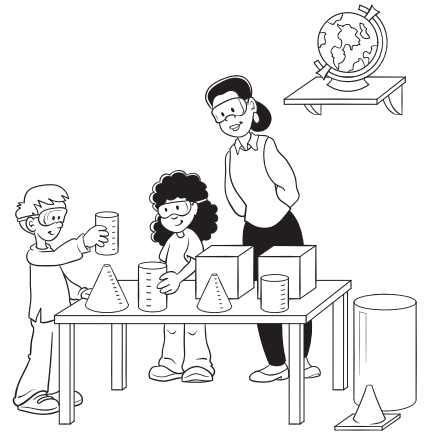
Answer:
The object cylinder is behind the cone.
The object cylinder is in front of the cube.
The object cone is infront of the cube.
Explanation:
In the above-given question,
given that,
The object cylinder is behind the cone.
The object cylinder is in front of the cube.
The object cone is infront of the cube.
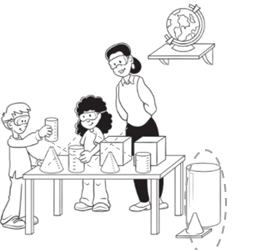
DIRECTIONS 1. Circle the set that shows an object shaped like a cone in front of the object shaped like a cube. 2. Which shape is a triangle? Color the triangle. 3. How many of each color counter? Write the numbers.
Lesson Check
Question 1.

Answer:
The object cone is in front of the cube.
Explanation:
In the above-given question,
given that,
the objects are cube and cone.
The object cone is in front of the cube.
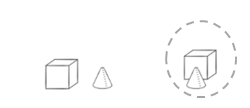
Question 2.

Answer:
The shape is a triangle.
Explanation:
In the above-given question,
given that,
the shapes are circle, hexagon, triangle, and square.
The shape is a triangle.

Question 3.
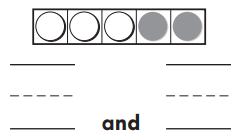
Answer:
The number of buttons = 5.
Explanation:
In the above-given question,
given that,
3 + 2 = 5.
The number of buttons = 5.
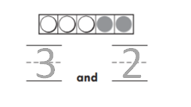
Identify and Describe Three-Dimensional Shapes Review/Test
DIRECTIONS 1. Mark under all the shapes that stack. 2. Which objects are shaped like a sphere? Mark an X on each of those objects. 3. Do the words describe a cube? Circle Yes or No.
Question 1.

Answer:
The shapes that has stack is cube and cylinder.
Explanation:
In the above-given question,
given that,
The shapes are cone, cylinder, sphere, and prism.
The shapes that has stack is cube and cylinder.
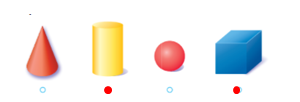
Question 2.
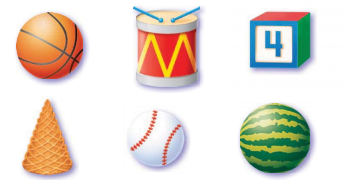
Answer:
The number of objects that shaped like a sphere = 3.
Explanation:
In the above-given question,
given that,
the objects are ball, cylinder, cube, cone, ball, and watermelon.
The number of objects that shaped like a sphere = 3.
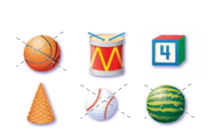
Question 3.
THINK SMARTER+

Answer:
Yes, the words describe a cube.
Explanation:
In the above-given question,
given that,
the cube has 6 sides and it has curved surface.
Yes, the words describe a cube.

DIRECTIONS 4. Draw lines to match the objects to their shapes. 5. Which objects are shaped like a cone? Mark an X on each of those objects. 6. Color the solid shapes blue. Color the flat shapes red. Draw another flat shape that is different.
Question 4.
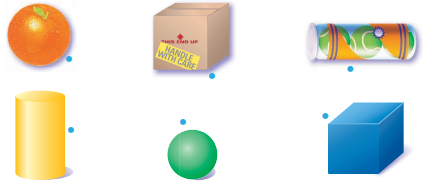
Answer:
The objects are cube, sphere, and cylinder.
Explanation:
In the above-given question,
given that,
the objects are cube, sphere, and cylinder.
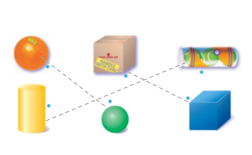
Question 5.

Answer:
The number of cone = 2.
Explanation:
In the above-given question,
given that,
the objects are cones, sphere, and cube.
The number of cones = 2.

Question 6.
THINK SMARTER+
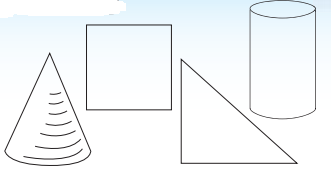
Answer:
The flat surfaces = blue.
the solid shapes = red.
Explanation:
In the above-given question,
given that,
the objects are square, triangle, cylinder, and cone.
flat surfaces = square and triangle.
solid surfaces = cone and cylinder.
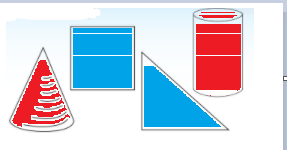
DIRECTIONS 7. Draw an object that has the shape of a cylinder. 8. Circle the shapes that show the cylinder above the cube. 9. Mark an X on the object shaped like a cylinder next to the object shaped like a cone.
Question 7.
Answer:
The shape is a cylinder.
Explanation:
In the above-given question,
given that,
the object is cylinder shape.
the shape is a cylinder.
Question 8.
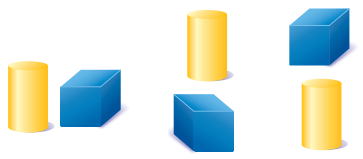
Answer:
The object cylinder is above the cube.
Explanation:
In the above-given question,
given that,
the objects are cube and cylinder.
The object cylinder is above the cube.
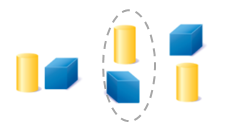
Question 9.

Answer:
The object cylinder is next to the cone.
Explanation:
In the above-given question,
given that,
the objects are cube and cylinder.
The object cylinder is next to the cone.
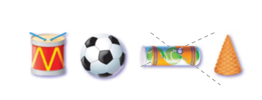
DIRECTIONS 10. Mark an X on the cone in front of the cube. 11. Mark an X on the cube that is beside the cone. 12. Mark an X on the sphere that is below the hexagon.
Question 10.
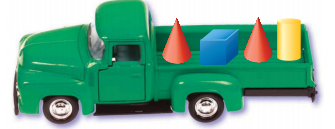
Answer:
The object cone is in front of the cube.
Explanation:
In the above-given question,
given that,
the objects are cube and cone.
The object cone is in front of the cube.
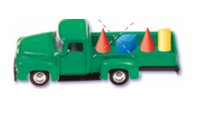
Question 11.

Answer:
The object cube is beside the cone.
Explanation:
In the above-given question,
given that,
the objects are cube and cylinder.
The object cube is beside the cone.

Question 12.
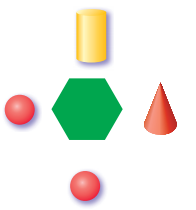
Answer:
The object sphere is below the hexagon.
Explanation:
In the above-given question,
given that,
the objects are hexagon and cylinder.
The object sphere is below the hexagon.

